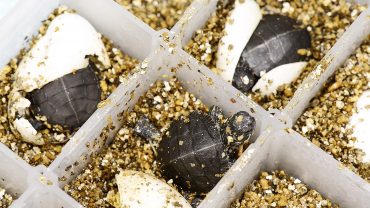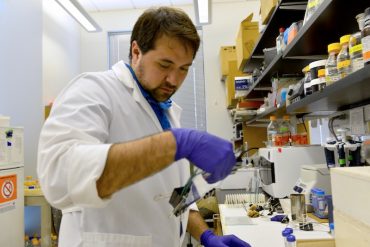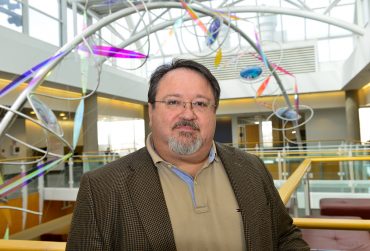Bond Life Sciences

May 15, 2017
BPA rewires the sex of turtle brains
By Jinghong Chen | Bond Life Sciences Center Painted turtle eggs were brought from a hatchery in Louisiana, candled to ensure embryo viability and then incubated at male-permissive temperatures in a bed of vermiculite. Those exposed to BPA developed deformities to testes that held female characteristics.Photo by Roger Meissen | © 2015 – MU Bond Life Sciences Center Cool dudes, hot mommas. This is the underlying concept behind sex development in painted turtles, a species that lacks sex chromosomes. A painted turtle’s sex is determined by temperature at which the eggs are incubated at…

June 20, 2014
Nerve cell communication mechanisms uncovered, may lead to new therapeutic approaches for neurodegenerative diseases
Story by Madison Knapp/ Bond Life Sciences summer intern Simple actions like walking, swallowing and breathing are the result of a complex communication system between cells. When we touch something hot, our nerve cells tell us to take our hand off the object. This happens in a matter of milliseconds. This hyperspeed of communication is instrumental in maintaining proper muscle function. Many degenerative diseases affecting millions of people worldwide result from reduced signaling speed or other cellular miscommunications within this intricate network. Michael Garcia, investigator at the Christopher S. Bond Life Sciences Center and associate professor of biology at…

June 10, 2014
SoyKB: Leading the convergence of wet and dry science in the era of Big Data
Yaya Cui, an investigator in plant sciences at the Bond Life Sciences Center examines data on fast neuron soybean mutants that are represented on the SoyKB database. The most puzzling scientific mysteries may be solved at the same machine you’re likely reading this sentence. In the era of “Big Data” many significant scientific discoveries — the development of new drugs to fight diseases, strategies of agricultural breeding to solve world-hunger problems and figuring out why the world exists — are being made without ever stepping foot in a lab. Developed by researchers at the Bond Life…

April 28, 2014
A drug that packs a punch: new compound works better against resistant HIV
Bond LSC researcher Stefan Sarafianos stands in the LSC atrium. The virologist is an associate professor of molecular microbiology and immunology and Chancellor’s Chair of Excellence in Molecular Virology with appointments in MU’s School of Medicine and the Department of Biochemistry. Resistance is the price of success when it comes to treating HIV. Virologists at the Bond Life Sciences Center are helping to test the next generation of anti-AIDS medication to quell that resistance. Stefan Sarafianos’ lab recently proved that EFdA, a compound that stops HIV from spreading, is 70 times more potent against some HIV…